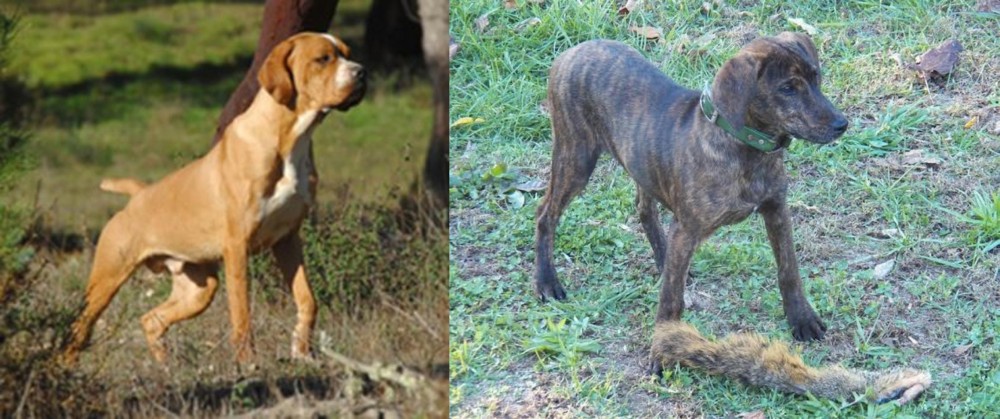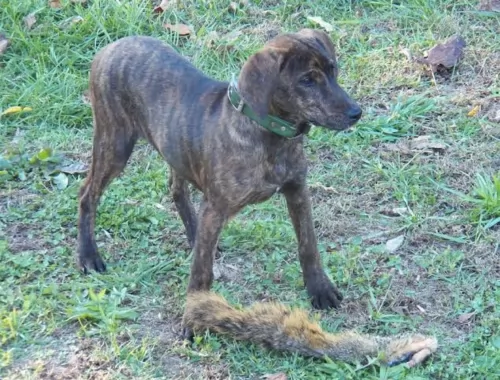 Petzlover
Petzlover Portuguese Pointer is originated from Portugal but Treeing Cur is originated from United States. Both Portuguese Pointer and Treeing Cur are having almost same height. Both Portuguese Pointer and Treeing Cur are of same weight. Both Portuguese Pointer and Treeing Cur has almost same life span. Both Portuguese Pointer and Treeing Cur has same litter size. Both Portuguese Pointer and Treeing Cur requires Low Maintenance.
Portuguese Pointer is originated from Portugal but Treeing Cur is originated from United States. Both Portuguese Pointer and Treeing Cur are having almost same height. Both Portuguese Pointer and Treeing Cur are of same weight. Both Portuguese Pointer and Treeing Cur has almost same life span. Both Portuguese Pointer and Treeing Cur has same litter size. Both Portuguese Pointer and Treeing Cur requires Low Maintenance.
 The Portuguese Pointer comes from Portugal where the dog was developed as a gun dog. It is believed that the dog is descended from the Spanish Pointer and developed to point out game.
The Portuguese Pointer comes from Portugal where the dog was developed as a gun dog. It is believed that the dog is descended from the Spanish Pointer and developed to point out game.
The dog was was recognized by the United Kennel Club in 1996.
The dog was introduced to England in the 18th century and the modern type of the Portuguese Pointer became established in the early 1900’s when the breed had become endangered. A group of breeders re-established its numbers.
Today it is both working- and companion dog. The UK Kennel Club recognised it as a breed in 2014.
 The Treeing Cur dog is a mixed-breed, working dog which hails from the USA and recognized by the United Kennel Club in November 1998.
The Treeing Cur dog is a mixed-breed, working dog which hails from the USA and recognized by the United Kennel Club in November 1998.
They’ve always been used to tree animals such as squirrels, raccoons, bears, and even mountain lions. They were developed to be used as hunting and guarding dogs.
Aside from these good qualities, today the dog makes an excellent family companion.
 Originating from Portugal, the attractive, almost Boxer-like looking dog is a medium sized purebred dog that stands at between 48 and 60cm in height and weighs roughly 16 to 27kg.
Originating from Portugal, the attractive, almost Boxer-like looking dog is a medium sized purebred dog that stands at between 48 and 60cm in height and weighs roughly 16 to 27kg.
The Portuguese Pointer has a coat that is light brown, tan or yellow. The dog has a short, easy to maintain coat. He has a fairly square face, much like the Boxer, floppy ears with a long tail. The tail is usually docked. The eyes are brown and he a bright, alert, kind expression.
The Portuguese Pointer is a dog with strong hunting instincts, but who still has time to make a splendid companion for his human family. He is gentle and loyal to his human family, being somewhat reserved with strangers. This is a good thing really as this makes him a good watchdog.
He is good with other pets in the home as well as with children. He badly wants to please his family, and because he is intelligent and a fast learner, you won’t have any trouble with training and socialization.
He is a sociable dog, loving to be close to its owner. He is active and will require quite a bit of exercise, loving to join in with games with the children. He gets on well with children in the home as well as with animals.
 Standing at between 46 – 61cm in height and weighing between 14 – 27kg, the medium-sized Treeing Cur is athletic and muscular.
Standing at between 46 – 61cm in height and weighing between 14 – 27kg, the medium-sized Treeing Cur is athletic and muscular.
He has a short to medium-length double coat that can be in a number of colors. Red and white, tan and white, black and white, brindle, some freckling and bi-colored or tri-colored.
The eyes are mostly brown but can be green or blue too. They’re well-muscled and robust and have medium length floppy ears. The tail is mostly docked but is sometimes left long.
These dogs are alert and intelligent, being easy to train and wanting to please their owners, getting along well with all members of the family, including children and other dogs.
They’re strong-willed dogs and will require training and socialization if you want them to be well behaved wherever they are. He is intelligent so there won’t be any trouble with training him. He is very responsive to what his owner requires of him, with a desire to make their owners pleased with them.
 The gorgeous Portuguese Pointer makes such a loyal and loving pet. He is always looking out for his human family, making sure that they are safe and protected under his watch.
The gorgeous Portuguese Pointer makes such a loyal and loving pet. He is always looking out for his human family, making sure that they are safe and protected under his watch.
He is an excellent watch dog too, proudly running around outside and making sure that there are no intruders around. They are good with kids too if the kids are gentle and kind with animals.
He loves a good game too and is always ready to take part in any activities you’re taking part in. The Portuguese Pointer is truly an awesome pet and companion.
 The Treeing Cur is a working dog that loves all the action. He is an alert, intelligent dog, and being territorial and protective, he makes an excellent guardian dog too.
The Treeing Cur is a working dog that loves all the action. He is an alert, intelligent dog, and being territorial and protective, he makes an excellent guardian dog too.
They can show some aggression towards strangers and other dogs they don’t know. Apart from being an excellent hunting dog, the Treeing Cur loves to be around their human family, making loyal and loving companions.
 Your robust Portuguese Pointer isn’t known to be a dog to suffer with too many breed related health problems. With good care he can reach 14 years of age.Portuguese Pointers are a healthy breed, but some health issues can crop up -
Your robust Portuguese Pointer isn’t known to be a dog to suffer with too many breed related health problems. With good care he can reach 14 years of age.Portuguese Pointers are a healthy breed, but some health issues can crop up -
Cancer is a leading cause of death in dogs young and old. Luckily, if caught early, cancer is curable. Some of the cancers found in dogs are malignant lymphoma – a tumor of the lymph nodes.
Skin cancer is also fairly common. The warning signs of cancer in dogs can be a new lump or a wound that won’t heal. While these are classic signs, sometimes there are no signs. If your dog isn’t feeling well, it’s time to get him to the veterinarian.
The liver is one of the vital body organs but it is susceptible to a wide variety of problems. It detoxifies the blood, stores vitamins and assists with digestion among other things.
One of the most common symptoms of liver disease is jaundice. When the liver isn’t functioning properly, bilirubin builds up in the blood and leads to the yellowish appearance of the dog.
Other common symptoms of liver disease include vomiting, weight loss and diarrhea. Veterinary attention will be required.
 These dogs are very healthy and you’re not likely to have many vet bills when you bring one into your home.
These dogs are very healthy and you’re not likely to have many vet bills when you bring one into your home.
The Treeing Cur has floppy ears, and particularly if it's a dog that loves swimming, it will battle with moisture in the ears. Dogs with floppy ears don’t have good air-flow inside the ears like a dog with erect ears would have. This means that the dog is prone to ear infections.
This is such a common dog illness that can strike even young dogs. That is why it is important to check your dog over regularly for lumps and bumps on the body. Age increases the risk of cancer, so if you feel an unusual lump on your Treeing Cur, better to have your dog checked out at the vet.
 The Portuguese Pointer has been a working dog and doesn’t enjoy lying around with nothing to do. Apart from a walk every day which he loves, he’ll want other activities that stimulate him mentally and physically.
The Portuguese Pointer has been a working dog and doesn’t enjoy lying around with nothing to do. Apart from a walk every day which he loves, he’ll want other activities that stimulate him mentally and physically.
His short coat means that he won’t require any special grooming. He does shed constantly, like many other dogs, and a good brush twice a week will keep his short coat vibrant and shiny.
Your canine friend will require protein in his diet as well as all the vitamins ad minerals for health. The very best commercially manufactured dog foods will be required for his health.
The dry kibble can be a wonderful convenient way to feed your pet. The best commercial foods meet the requirements for a dog’s diet. Give him some delicious home made food too. Boiled chicken, brown rice, sweet potatoes, carrots and spinach can be cooked in bulk and then chopped up and small portions mixed into the dry kibble twice a week as a treat.
It provides your pet with an alternative to the dry kibble, it is healthy, easy to digest and your pet will love it. Dogs thrive on simple consistency. Once in a while you can also give him some raw meat. Never leave him without a constant supply of fresh, cool water.
 Being an energetic working dog, this dog isn’t going to be content to be lying around. He is going to need regular exercise. He loves a brisk walk or even a run next to you when you go cycling.
Being an energetic working dog, this dog isn’t going to be content to be lying around. He is going to need regular exercise. He loves a brisk walk or even a run next to you when you go cycling.
When at home, you can consider ball games and hide and seek games with him. They just love to run, and if you live near a park, he will want to be off the leash if possible for some free running and sniffing around.
The short coat of the Treeing Cur will do well with a brush twice a week. While you brush your dog, check him out for ticks and fleas. Also, check him over for any unusual lumps.
Part of his grooming should be to check inside his ears for signs of redness, to make sure his eyes are nice and bright still and to see if he will let you look inside his mouth for bad teeth. Bad teeth can be a source of pain for him.
Caring for your Treeing Cur in a responsible manner means ensuring good food. Such an active dog will require proper nutrients so as to meet his energy and health needs.
Your Treeing Cur will need a high-quality commercially manufactured dog food for active dogs and they will also benefit from other simple cooked foods such as boiled chicken, brown rice and vegetables. The habit of feeding your Treeing Cur human foods such as chocolates, popcorn, peanuts, onions and spices could cause digestive upsets and possible vet fees.